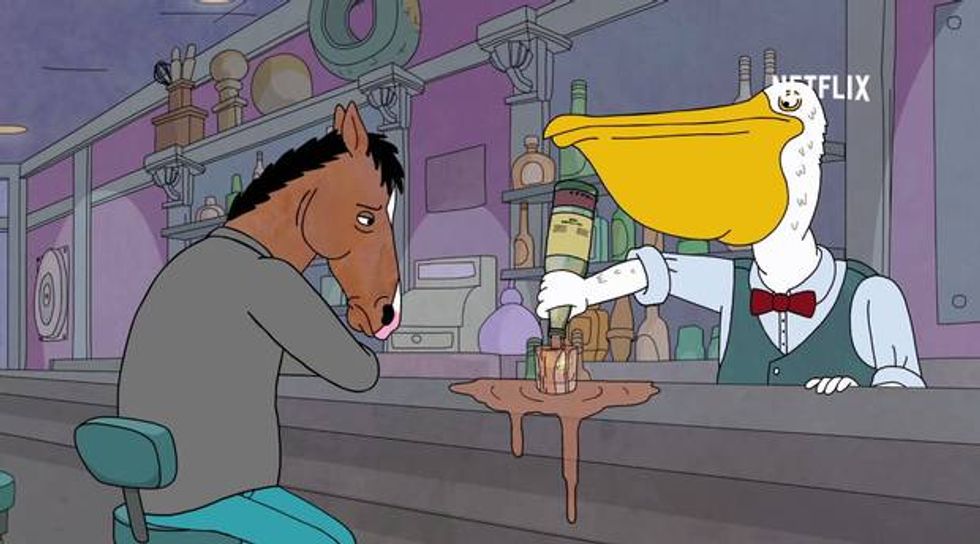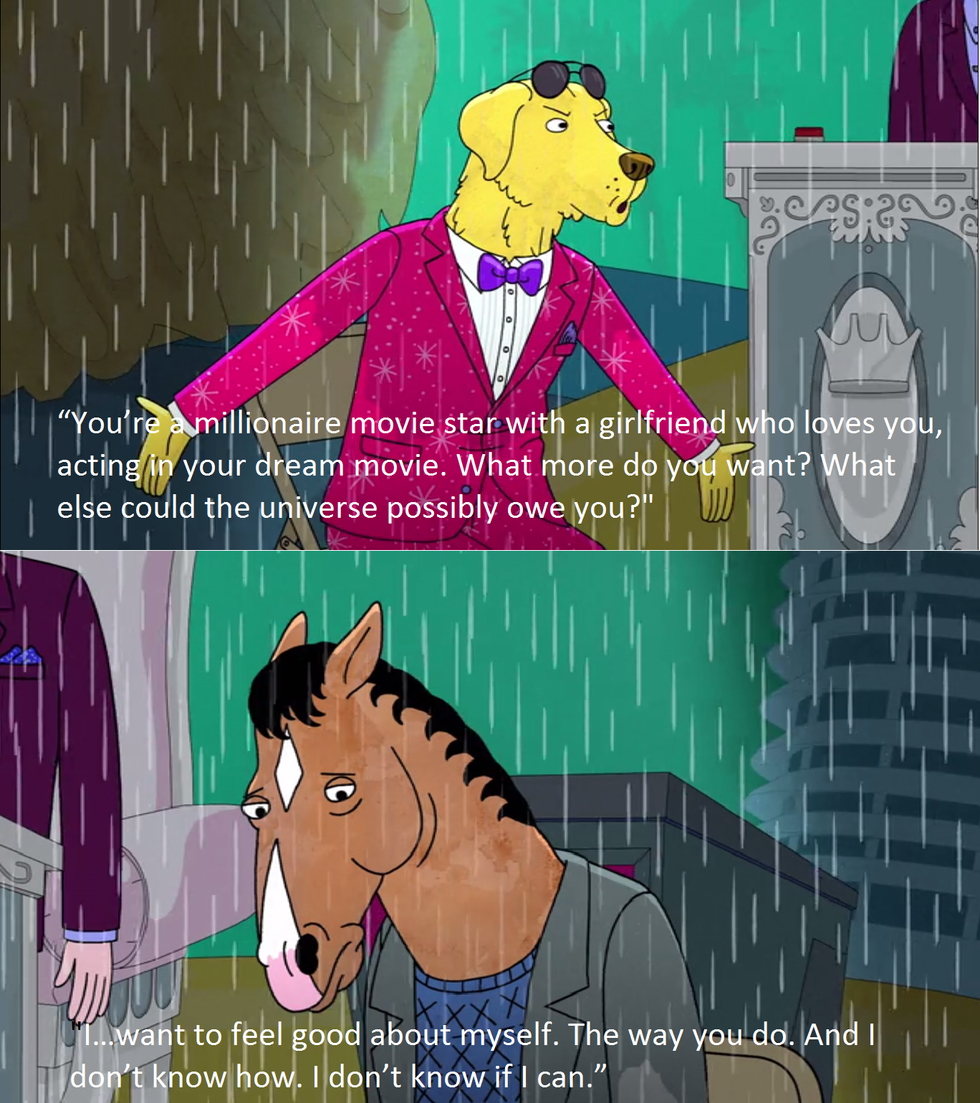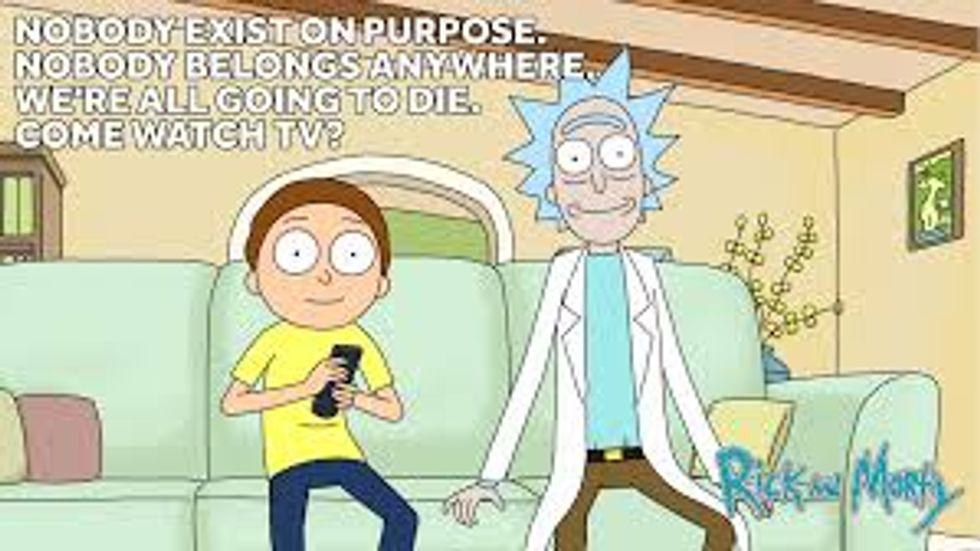Depression. Despite being a ubiquitously glib term used for "sad people" all around the world, few have a firm idea of what it truly means to be depressed. In order to clarify an often misunderstood condition, creative innovators have turned to animation to show the true reality of living with depression.
When it comes to portraying depression, getting it right can be difficult. After all, "sadness" and "depression" are often treated as synonymous terms. Typically, when depression is shown in television, and film, it is treated as brief sadness, an extension of a catalytic moment in a character's life, which is then "fixed" at some point. Think the Grinch after his heart grew three sizes; or the depressed are shown as eternally dour individual like Eeyore. These two common portrayals of depression fail to take into account the true breadth of the condition, that without proper treatment is difficult to live with and recover from, and create a mentality amongst people that view such glib portrayals of depression that the condition is a "mental state" rather than an illness. Fortunately, there are writers -- like Dan Harmon, Justin Roiland, and Raphael Bob-Waksberg -- who have been able to recently portray and demonstrate grounded, realistic, takes on depression, albeit in surrealistic animated television.
The premise of Raphael Bob-Waksberg's Netflix series, BoJack Horseman, is ridiculous in nature. The series follows an anthropomorphic horse, BoJack Horseman, who happens to suffer from depression. The world that BoJack inhabits is equally implausible, populated by humans and humanized animals. At a cursory level, it seems unlikely that a show that features a talking dog named Mr. Peanutbutter, a fictionalized Los Angeles where the 'D' from the Hollywood sign has been stolen (resulting in everyone referring to the town as "Hollywoo") and a still-living J.D. Salinger creating a Hollywood game show entitled Hollywoo Stars: What Do They Know?: Do They Know Things?: Let’s Find Out!would provide an appropriate outlet for discussing the nuances of the nature of depression. However, it is revealed through the absurdity of the setting of BoJack Horseman, the relatability and humanity of the titular character.
Much like a phoenix who rises from the ashes, throughout the two seasons of the show, BoJack Horseman (voiced by Will Arnett), a drunken misanthropic former sitcom star, puts his life back together. By the second season of the show, BoJack has everything that he has ever wanted, a girlfriend, respect, and a starring role in his dream movie, and yet still is not happy -- as evidenced in this exchange between Mr. Peanutbutter and BoJack Horseman:
As Bob-Waksberg is showing, BoJack is incapable of magically feeling cured of depression, he is stuck in a cycle of misery that no amount of success will spontaneously whisk away. The only constant in the life of BoJack Horseman is depression, and without the necessary treatment, BoJack, regardless of success, failure, triumph, or misery, will remain in a state of depression.
In a very similar vein to BoJack Horseman is the eponymous character in Dan Harmon and Justin Roiland's Rick and Morty. Rick Sanchez is a brilliant super-scientist capable of accomplishing his every goal and desire. With little apparent effort, Rick can construct devices that allow him to transcend time and space, shift dimensions, and travel throughout the universe. However, the problem is that Rick has no real desire, other than drinking to try and avoid his demons. Rick is a textbook alcoholic, and clearly suffers from depression (in fact, Rick's signature whimsical catchphrase is literally a thinly veiled cry for help).
In the most recent episode of Rick and Morty (*Spoilers*), "Autoerotic Assimilation," Rick reunites with his former girlfriend, Unity - a sentient HIVE-mind capable of enslaving entire worlds. At first the idea of being able to re-engage with a former fling gives Rick hope, but as the episode progresses, it becomes clear that Rick's self-destructive tendencies will drive Unity away. After she ultimately leaves Rick, it becomes apparent to Rick that there is no "one thing" that will ever give him the happiness that he craves. Despite the fact that Rick posses the ability to flee into a different dimension, if he wanted to escape the consequences of his mistakes, he in unable to for the sole reason that the Universe may change, but Rick Sanchez will remain the same destructive, depressed individual. With the God-like ability to shift the world around him, Rick cannot make himself happy.
Both of these surreal comedies are perfect allegories for what it is like for the average person living with depression. Depressed people cannot will themselves out of depression, it is a demon that continually tears into their mind as they live each and every day. Depression cannot be cured through success, or love, or some intangible idea. The cure for depression is treatment, because depression is not a state of mind, it is an illness. It is thanks to the writers on these major television shows, that the viewing public may gain a different perspective of what it means to be depressed.






















 sunrise
StableDiffusion
sunrise
StableDiffusion
 bonfire friends
StableDiffusion
bonfire friends
StableDiffusion
 sadness
StableDiffusion
sadness
StableDiffusion

 purple skies
StableDiffusion
purple skies
StableDiffusion

 true love
StableDiffusion
true love
StableDiffusion
 My Cheerleader
StableDiffusion
My Cheerleader
StableDiffusion
 womans transformation to happiness and love
StableDiffusion
womans transformation to happiness and love
StableDiffusion
 future life together of adventures
StableDiffusion
future life together of adventures
StableDiffusion





















